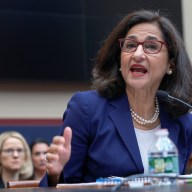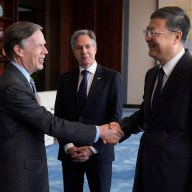LONDON, Ont. – It may be unpopular in British Columbia and Manitoba may be fretting about its financial impact, but tax harmonization is a subject that “rarely” comes up when he’s around, Ontario Premier Dalton McGuinty said Tuesday.
“Not a lot of folks are raising it with me, but I think there are some concerns – I think that’s fair to say,” McGuinty said before touring a new London, Ont. plant that makes high-end countertops.
“People are wondering about the necessity of doing it, and I take the opportunity whenever I can to speak about it. And it’s my firm conviction that the status quo is just not an option.”
His fellow Liberals are talking about it, McGuinty acknowledged. But when it comes to getting grief from the public, “I think ‘rarely’ is probably a good way for me to put it,” he said.
“But I fully expect that more Ontarians will talk about it as we talk about it, and as we get closer to implementation.”
The plan to merge the provincial sales tax with the five per cent federal GST, which proved to be politically toxic for some provinces that adopted it, isn’t going over so well outside of McGuinty’s earshot.
Premier Gordon Campbell is feeling the heat over his plan to meld the taxes just a few months after winning a third term, with thousands of British Columbians signing anti-HST petitions.
Manitoba, which has talked to Ottawa about blending the two taxes, is balking over concerns that it could end up costing the province more than $400 million a year.
And the federal government is distancing itself from the contentious tax change, which will increase the cost of many consumer items currently exempt from the provincial levy.
Conservative MPs and the Prime Minister’s Office have recently downplayed Ottawa’s role in convincing more provinces to move towards tax harmonization, saying it had nothing to do with the decision even though it’s kicking in billions of dollars to make it happen.
Ontario is receiving $4.3 billion and B.C. will get $1.6 billion in federal cash to ease the transition to a single sales tax, which will take effect next July.
McGuinty may have heard few complaints so far, but opposition parties are vowing to make it the central issue in an upcoming Toronto byelection.
Both the Progressive Conservatives and the NDP are taking aim at the tax change in the lead up to the Sept. 17 vote.
Losing the riding would be a blow to the governing Liberals, who held the seat for a decade under former cabinet minister Michael Bryant, who resigned in May.
Nova Scotia, New Brunswick and Newfoundland and Labrador harmonized their sales taxes with the federal GST more than 10 years ago. Quebec partially harmonized its sales tax system and Alberta has no provincial sales tax.
That leaves Saskatchewan, Manitoba and Prince Edward Island as the remaining holdouts.
The public uproar over harmonization in Nova Scotia contributed to the Liberal government’s defeat in 1999.
Former Saskatchewan premier Grant Devine, who harmonized sales taxes in 1991, was defeated in the next election by the New Democrats, who split the taxes up again.
















